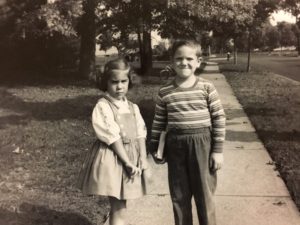
It may be hard for young people today to realize that earlier generations did not document every moment of their lives with videos, photos and selfies. Taking photographs was a bit more laborious, and they had to be “developed” and sometimes got lost over time. So I don’t have a ton of old family photos.
This is one I do have, though. It is my first day of school, and “Kindergarten, 1961” is written on the back in my father’s hand. No doubt he stood looking down into the Brownie camera with the red lever on the side and took this photo—with unhappy next-door neighbor, Ellen Diamond, beside me as we headed off to our first day of school.
I feel many things when I look at this photo. What happened to that innocent little boy? Can you believe there was a time when parents let a four-and-a-half year old child walk to school? Mostly, I think about this: I have been in school consistently for the fifty-six years that have followed, whether as a student, a teacher or an administrator.
I don’t think I could have imagined that—dreams of being a baseball pitcher and a rock guitarist would dominate my youth—though my father was a teacher, so it’s hardly a surprise.
But lately, something in that picture has become more sharply focused for me. Only late in life, after a generation of teaching and being an educator, have I come to realize how privileged I was. My parents not only thought the first day of school was worthy of commemoration, but they assumed they would oversee and supplement my education all the way through college, which they did. There was never a doubt in their minds that I and my siblings would graduate from college (and, indeed, we all did and all became educators).
We were a family of modest means. My father was a high school teacher in the Bronx; my mother was a homemaker. But both of them had graduate degrees, and their very different routes to those degrees contributed to my growing up in a household suffused by education.
My mother had a bachelor’s and master’s degree in Occupational Therapy, earned at a time when fewer than 15% of women graduated from college. More remarkably, both her father and mother were educated professionals—CPAs who jointly ran a family accounting firm. That my grandmother, born in the 1890s, had that level of education meant my mother had examples at home that few other women born in the 1920s had. That unspoken assumption—that an education was not only valuable but the pre-requisite to a rewarding and fulfilling life—was part of her upbringing.
It wasn’t part of my father’s. His mother emigrated to the U.S. from Slovakia in the first decade of the twentieth century, alone, at the age of 16. She married a first-generation American, son of Russian immigrants, whose mother was illiterate and whose father was a dairyman. My grandfather was forced by his parents to quit school after eighth grade to go to work—something he resented bitterly.
These two New Yorkers with high-school educations, one a non-native speaker of English, had two children (who survived). Both of those children became—well, English teachers. My father went to CUNY and then added a master’s degree from Columbia Teacher’s College; his sister had a Ph.D. in medieval literature and was a college professor.
The generation that followed—my generation with my two siblings and five cousins—had tremendous opportunities as a result of our parents’ educations. I suppose we all took that for granted, at least when we were young. All of us graduated from college, most from graduate school, and all are professionals.
I feel in that cheerful picture of me with my polo shirt and slicked back hair that I was the double beneficiary of my mother’s world in which educated men and women were a given
and my father’s world in which education was all the more dear because it was not a given.
What’s important to remember is that we do not show up equally on the first day of school. I had tremendous advantages, thanks to the education my parents received and the values that came with it. For many other kids—in 1961 and today—that path to college is anything but assured. Their parents are just as loving and determined—no question. But statistics tell us that the likelihood of graduating from college is stubbornly tied to both family income and parental educational level.
Our role as educators—what we do every day at Sage—is to swim against that tide and create opportunities for students of all kinds and from all backgrounds, opportunities for themselves and ultimately for their children, too.
When I look into that photo of young Chris Ames, I look back through my young self to my parents and grandparents and realize why they thought it was a moment worthy of a photograph.
